#everyday i thank the wrestling gods the elite does the things they do
Text
Don't let anything distract you from the fact Kenny's got stretch marks from ancient dick stretching techniques which Hangman has seen
#just a totally normal thing to say about you and your buddy#they're insane and i think they should get even more insane around each other#they definitely fuck dumb nasty#pics or it didn't fucking happen#they're in love <3#everyday i thank the wrestling gods the elite does the things they do#hangman adam page#kenny omega#being the elite#bte
74 notes
·
View notes
Text
TOP ECCHi ANiME TO WATCH FOR
It’s sexy time now or in anime terms, it’s ‘ecchi’ time now. After doing a list about some of the popular harem anime out there, why not compile another list, this time with popular ecchi anime. The ecchi genre has been a fan favourite for a long time. So much so that there are special fanservice episodes in anime from other genres. Though I am not an avid watcher of ecchi anime sometimes I do tend to dwell in them. If you are looking for some sexy anime the here’s a list compiled just for you. So, let’s see what are some of the top ecchi anime out ever. You can watch some of these best ecchi anime movies on Crunchyroll or YouTube. Most of these anime are erotic and hot
10. No Game No Life (2014)

‘No Game No Life’ is a fantasy, ecchi anime. It has been made bright, colourful, and is filled with fan service. I liked the premise of the movie (though it has been done before). The base theme is that you have to play high-stake games to make critical decisions. Thus, this removes all kind of action, bloodshed, and war. So, if you are into that action anime then I suggest you skip this one. Sora and Shiro are one of the best online gamers. They are siblings who are not currently pursuing any sort of education or doing any jobs. Their online game username is ‘Blank’ which has achieved a sort of legendary status. They don’t go out much and feel that the real world is nothing but a lame game.
One day they receive an e-mail which challenges them to play a match of chess. This starts their adventures in another realm where every rivalry and problem is solved by games. The ruler of this world, Disboard, is Tet, who is the God of Games. This system of settling disputes and discord via high-stake games works pretty well for one particular reason. Both the parties must wager something equal in value to the wager of the opposite party. Now, the gaming genius duo Sora and Shiro has got a reason to play games. They must unite all the races of this world to play against Tet so that they become the new God of Games.
9. Kill la Kill (2013)
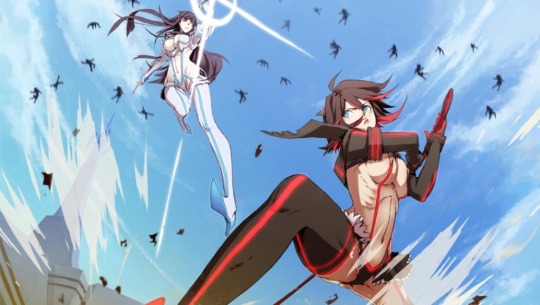
‘Kill la Kill’ is an entertaining anime. There are two ways of watching this show. You can watch it as a parody of sorts and enjoy how it satirically criticizes the stereotypical anime paraphernalia. You can also watch it as a common ecchi, action anime with strong female leads and lots of funny scenes. Whichever way you choose you will end up having fun while viewing this show. Though at first, the series might feel a bit confusing and clichéd it matures gradually as the series approaches the end. Ryuuko Matoi is the protagonist of the series. Her father was an inventor. One of his inventions is a scissor-like weapon. It is the missing half of this weapon which serves as the only remaining clue of his murder that Ryuuko has.
With the remaining half of the scissor blade, she ventures out to find the killer of her father and avenge his death. Her investigation takes her to Honnouji Academy. It is a prestigious academy at the top of which is the cold and heartless Satsuki Kiryuuin, the student council president. Four people serve her and are known as the Elite Four. They have been given God Clothes by Satsuki which grants them superhuman powers. Ryuuko tries to fight one of them but looses and retreats to her home. There she finds a rare God Cloth which after coming in contact with her blood latches onto her. This gives her immense superhuman abilities.
Now, armed with power Ryuuko ventures once again to the Honnouji Academy to face Satsuki and her underlings to uncover the culprit behind her father’s murder.
8. Highschool of the Dead (2010)

The only reason I decided to include ‘Highschool of the Dead’ is that I found it quite entertaining. Mind you it is nowhere close to some great ecchi anime like ‘Shokugeki no Soma’ but it is entertaining nonetheless. It is an erotic zombie apocalypse anime with lots of fanservice. There are some steamy hot scenes in this anime. It does not plan to intrigue the viewers with a complex and interesting plot or relatable characters (though at times you can relate with some of them) but rather let them enjoy a sexy little zombie apocalypse anime. So, if you are a fan of the genre then you might enjoy it.
The plot starts with the world suddenly amid a zombie apocalypse. People start turning into the undead. The entire social structure is experiencing a great demise as humans start feeding on each other. Takashi Kimuro is the protagonist of this anime. His friend, unfortunately, turns into a zombie. Takashi takes the harsh decision and kills his friend before he can harm anyone. He promises to protect the girlfriend of his friend. As they navigate through their school campus they meet a bunch of other students and a school nurse. All of them are trying to escape this predicament. They decide to bundle up together and work as a team so that they can survive this apocalypse.
7. Sekirei (2008)
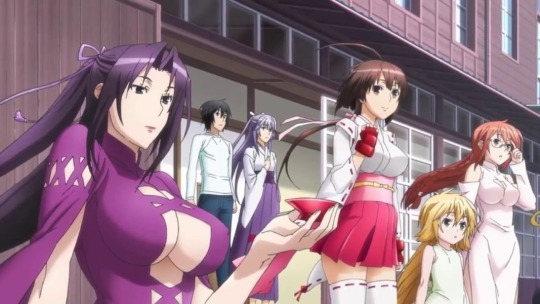
‘Sekirei’ is a popular ecchi genre anime and like lots of other anime in this genre, it too uses the supernatural theme. The series has some funny scenes and some over-the-top action sequences. The female characters, who are the centre of attraction for all ecchi anime fans, in this anime are quite pretty and sexy. They are nicely endowed and have voluptuous figures. Though it is common in these types of anime I felt that ‘Sekirei’ was somewhat misogynistic in its approach. It is one thing to make women wear skimpy and tight clothes (which is quite staple in any ecchi anime) but it is another thing to treat them as objects. This was one of the most obnoxious things about this anime. If you can get over this fact then it will become a fun little anime which you can either binge or watch an episode or two once in a while taking a break from your regular stuff.
Though Minato Sahashi is not an idiot he keeps struggling with academics. He tries hard but ends up failing the college entrance exams a second time. He and people around him lose their hope and think that Minato is a failure. But suddenly his life changes when a beautiful human-like extraterrestrial-being falls into his life (literally). Her name is Musubi. She is a Sekirei, special beings who kiss humans who possess a special gene to unhide their secret powers. Musubi brings out Minato’s hidden powers but now he is paired with her to compete against other similar pairs. What Minato doesn’t know is that there is far more danger regarding this than he thinks.
6. Yuragi-sou no Yuuna-san (2018)
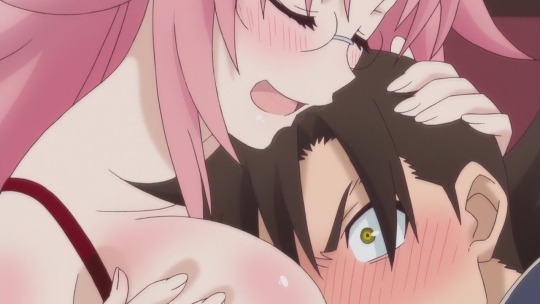
Up next is another supernatural ecchi anime. If you fantasize about sexy supernatural or fantastical beings then you will enjoy ‘Yuragi-sou no Yuuna-san’. There are 12 episodes in this series and each episode is around 23 minutes long. If you have ventured into the ecchi genre after watching anime like ‘Shokugeki no Soma’ then I will suggest you not to hang around this genre much, since most anime are not remotely like it. They are filled with lots of fanservice and buxom beauties and that’s mostly about it.
Fuyuzora Kogarashi is a medium and has been troubled by spirits since his childhood. He has been possessed many times but as he grew older he became more resistant towards the spirits and can now even exorcize them with just a punch. But he is poor and in need of a cheap boarding house to stay in. He finds it quite cheap to stay at the Yuragi manor. The main reason that this Manor is cheap is that it is haunted. But having dealt with ghosts most of his life Fuyuzora has no problem with it and starts staying in the house. The other tenants of the house are beautiful and sexy females. There he meets the ghost of the girl who is haunting the house. After Fuyuzora vows to help fulfil her lingering wish, the other members of the house reveal their supernatural nature.
5. Sankarea (2012)
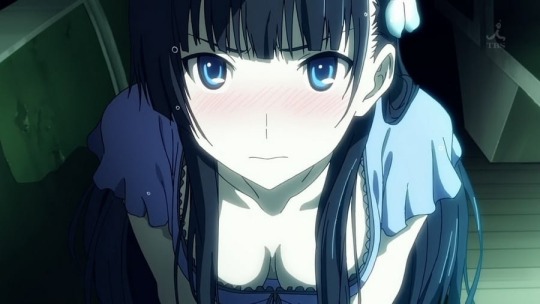
The next anime is an odd one. ‘Sankarea’ had one of the most unusual plots. The main character is Chihiro Furuya a boy obsessed with everything ‘zombie’. He is so into them that he even wants a zombie girlfriend. One day Chihiro’s cat Baabu dies. This makes him determined to create a resurrection potion. He finds one of the main ingredients in Rea Sanka’s, a girl who wishes to die, house. After the potion is complete Rea decides to drink it thinking that the potion will kill her. But the potion was successful and when Rea, dies in an accident she is resurrected from the dead thus, becoming a zombie. Though this situation may seem ideal for Chihiro he faces a lot of trouble to deal with Rea.
4. Mayo Chiki! (2011)
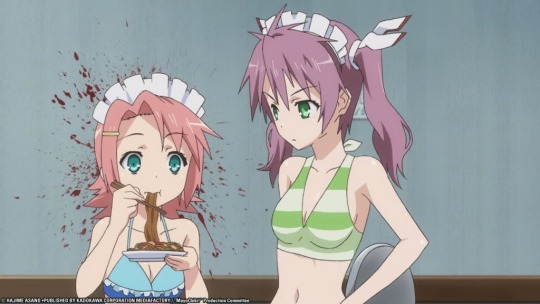
Kinjirou Sakamachi had developed gynophobia, a fear of women, thanks to his mother and sister’s wrestling obsession. One advantage did come out of this though, his body has become very resilient allowing him to even brush off bumps from vehicles. But his fear is quite abnormal so much so that even a touch from a female can make his nose bleed. He ends up discovering that Subaru Konoe, who is the butler to his headmaster’s daughter, is a female. In exchange for secrecy, she promises to cure his phobia.
3. Prison School (2015)
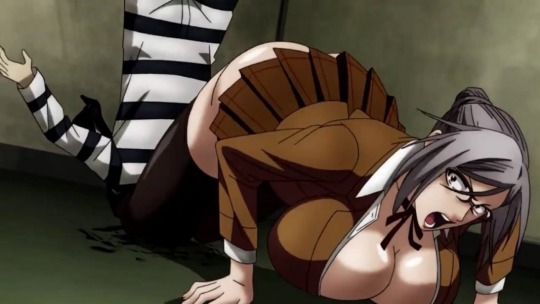
Hachimitsu Private Academy is a popular all-girls academy until very recently when it decided to let boys enrol. After the first enrollment process, only 5 boys are selected. This puts them in a very awkward position as they cannot converse with almost any of their classmates since they are all female and ignore them. They try to find recluse in being peeping toms. But they are caught and thrown in the school prison for one month. Will they be able to survive or will they break?
2. High School DxD (2012)
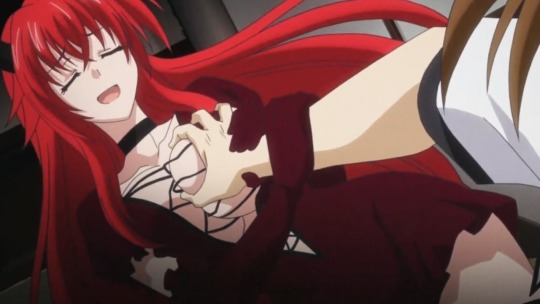
Issei Hyoudou is your everyday pervert who wants to own a harem someday. He enjoys peeping on women. One day he is asked by a girl. Unfortunately, the girl is a fallen angel who wants to kill Issei and is successful in doing so. End of story, right? Wait! Issei is then resurrected by Rias Gremory, a devil, who makes him her servant. Now, Issei must adjust to this new lifestyle and survive in the vicious world of devils and angels.
1. Shokugeki no Souma (2015)
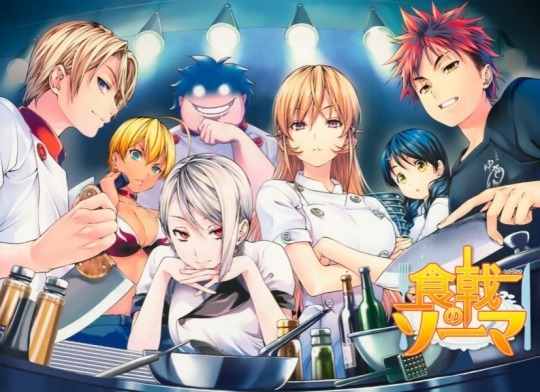
Souma Yukihira has been working as a sous chef under his father in their family restaurant. He is quite creative in his cooking style and entertains the customers with skilful culinary creations. His dream is to one day become the head chef of the restaurant. His dream is however cut short when his father closes down the business and enrols Souma in Tootsuki Culinary Academy. Now, he needs to work hard since only 10% of the students can graduate. Will he be able to survive the academy and its famous food wars?
12 notes
·
View notes
Text
Gabo's Podcast : DAGA
DAGA interviewed by Gabo
youtube
(Video starts with Daga telling a funny adecdote from when he was wrestling)
Daga: I remember a funny anecdote from when I was starting in wrestling where I was forming part of a trio in Arena Coacalco with Eterno who is wrestling in IWRG and has wrestled in Tijuana a couple times and a kid named Lobo Metalico who was part of my generation.
He was in the ring and he was getting kicked on the bottom and from these kicks, his tights ripped. He wasn't wearing anything under them so he was exposed then. The worst thing about it was that he was bending over pointing at our corner so we saw everything. So that was a funny story.
It was match of the night and unfortunately there was an accident where your partner was injured. What are your thoughts on the match and this accident?
Daga: Well, its part of the job. I've always compared things like this. Painters are dirtied with paint. Mechanics get grease on them. Wrestlers are always picking up knocks and getting small injuries. The good thing was that it wasn't serious. He's already moving around and talking to everyone. So that's good. They're good regulars here.
It's my first time wrestling for Bajastars and in San Diego. I've wrestled in Los Angeles, the people have received me well. They supported me and I think they left with a good taste in their mouth.
Your match is what sent the fans home happy and you got a good response from them, it's the most they can give you.
Daga: Yes, of course. I've always said that the fans should leave content and not with a bad taste. If they had left with that finish then I don't think it would have been a good show for them. For us it's good because now we know we're good and healthy.
But I do think the fans always deserve something. The Wrestling is for the fans and not the other way around. That is why I decided to challenge Bestia to one more fall.
Lots of wrestlers recently have injured their shoulders. Your rival, Garza Jr. had ruptured his ligaments.
What are your goals for year and have coming up?
Daga: This has been an important year. I have worked for a lot of American promotions like AAW and PCW. There are some that I still have left to do like PWG, and another tour of Japan. I would love to go to Japan for a couple months. I want to keep growing on the independents.
I think that I'm comfortable to keep on convincing. So keep growing and offering good wrestling so that the fans are always happy with my work because that's what I think has helped me recently. My independent work.
How old is Daga?
Daga: 29. I just turned 29 this year. I'm not that boyish like before.
What is the incentive for Daga to keep going as an independent? To join a top company? To try to get into WWE? Or stay as an independent?
Daga: I think that there are issues to be settled with some companies. Specifically Underground with a few things. Of course I would like to get to WWE or, I think this other option is on par with them, it would be to wrestle for New Japan. I think it would be the best for my career. But right now the objective is to keep growing as an independent.
I still have some years to wrestle and compete at a high level. So I will keep giving my best.
Now I will get a little personal with you for this next segment of the interview. (Talk non-wrestling topics)
What movies do you like?
Daga: I like a little bit of everything. I enjoy all types of genres. I can watch anything, Drama, Terror, Romantic, Action, all of it. There is one that is my favorite. There is a movie that is my favorite, I even have a tatoo right here (shows bicep). It's the language that is used in the movie "Lord of the Rings" and the books by Tolkien. "Lord of the Rings" is my favorite movie. It doesn't say the title of the movie, it's just the language.
It doesn't say my precious?
Daga: No. It does not say my precious (flexes and points at bicep) That saga is my favorite film.
Comics? Anime? or if your read any books?
Daga: I like some books. I like Alejandro Jodorowsky. He's really good. I like Haruki Murakami, who I read a little of. When I travel, I do get some time to read. Like 30 minutes I'll read a little and try to get an hour everyday. But when I'm working a lot and traveling, I'll get to the place and sleep.
When I wake up I got to go to the gym and get going. But when I have time, I will be at home reading, I like Murakami and Jodorowsky to pick up a nugget of wisdom. There have been fans that will gift me some books. One gave me "The Psychoanalyst" and I have yet to read it all. I'm halfway through. But yeah, I like to read.
Comics, not really.
How is your marital status? Single, Married, Widowed?
Daga: I'm not single. I'm not married.
OK. Perfect. Ladies, I'm sorry.
Favorite style of music?
Daga: Dang. I'm a 4x4 in that department too. I don't have a favorite and I like a little of everything. In music I think there is a lot that is catchy. I don't have anything against any type. I enjoy Regeaton, Banda, Salsa, I like it all, but there are some songs I really like. If I like it no matter the genre, I'll keep putting it on. It can be anything. A bolero to a rap. It's all good.
That's cool. (funny anecdote from intro)
(Daga touches on another funny story that happened to him while wrestling)
Daga: Personally not many. One time there was a group of girls at the show cheering me on and were hugging and grabbing me when I passed by. One bit me in the back.
Have you filled out your bookings for this year or are you needing more dates?
Daga: There are some dates. I had the last two weekends of November booked but, now those are open. I think those are the only ones I have open this year. Thank God there is work.
Where can people find you?
Daga: Yes, you promoters or fans that want to follow me can find me on Facebook, the fanpage 'Daga Luchador Oficial' or Instagram 'Dagathewrestler' or Twitter '@Daga_Wrestler'. Those are the only three social media accounts that I manage.
As you know, there are a lot of pages that promote otherwise. Promoters that are watching are able to send me Inbox messages or DMs. Those are the only accounts.
Did you get into trouble with your girlfriend when that fan bit you in the back?
Daga: No. That happened when I was younger. A lot younger. I was frightened because I thought it how was it possible for them to bite me.
Bro, you were really skinny and now look at you!
Daga: Well, it's been two years of constant training. I have a sponsor and team that I train with named Elite team pro. My lifting coach is Waldo Garcia. He's been on me for two years. I think my physique has changed a lot in the past two years. I even have a competition coming up.
So people of Tijuana, do not get angry because I wasn't at the anniversary show. There were personal reasons. I had already made plans for that date. They changed the date on me. I had the date saved from the year before. That is why I had to keep my word and be there.
We hope to see you soon and be successful with The Crash.
Follow Gabo on twitter https://twitter.com/el_rudo1 and his youtube channel https://www.youtube.com/user/gabychilo
5 notes
·
View notes
Text
Cornel West: Truth Excerpt from Examined Life: Excursions with Contemporary Thinkers
Edited by Astra Taylor
As dusk fell over Manhattan, I stopped to pick up Cornel West from his midtown hotel. He agreed to let me conduct an interview while driving him to the New School, where he was scheduled to give a lecture with the philosopher Simon Critchley. Although Examined Life was conceived as primarily pedestrian, the car ride seemed an appropriate way to bring the peripatetic concept up to date. How else would a modern-day flaneur travel? The cameraman sat in the front passenger seat; West and the soundman, who also operated the second camera, took the back. I did my best to guide the conversation while navigating rush-hour traffic.
Cornel West: So here we are in the middle of the Big Apple.
Astra Taylor: Since we haven’t settled on a theme in advance, let me throw some possibilities at you: truth, faith, love –
West: Truth is fine, truth is fine. Absolutely.
Taylor: OK, let’s go for truth. A big topic. [The engine starts and we begin our drive downtown.]
West: I think in many ways it is the ultimate question: What is truth? How do we understand truth and what are the ways in which we wrestle with truth? And I believe that Theodor Adorno was right when he said that the condition of truth is to allow suffering to speak. He said that the condition of truth is to allow suffering to speak – that gives it an existential emphasis, you see, so that we’re really talking about truth as a way of life, as opposed to a set of propositions that correspond to a set of things in the world.
Taylor: When we settled on this topic, my mind immediately went to Plato.
West: Well, in many ways I wish people would think of Plato, rather then [sic] Bertrand Russell. Bertrand Russell, one of the grand exemplary analytic philosophers, tried to convince us that truth really was about propositions that correspond to objects in the world, whereas Plato always understood truth as tied into a way of life, as a certain mode of existence. And so what he’s trying to get us to enact is paideia*, which I think at the end is really at the center of any serious philosophic project. How do you engage in that formation of attention? For Plato, that’s to move from becoming to being, but I would just characterize it as moving from the superficial to the substantial, moving from the frivolous to the serious, and then cultivating a self to wrestle with reality and history and mortality and, most importantly, promoting a maturation of the soul. And for Plato, that had to do, of course, with a turning of the soul, so that you become a certain kind of person. So I’m actually with the classics in general in terms of understanding truth in an existential mode. Therefore, philosophy becomes more a way of life as opposed to simply a mode of discourse.
Taylor: Let’s talk about that transformative aspect of philosophy. The title for this project is “Examined Life.” So what we’re trying to do is bring the Socratic imperative to the big screen.
West: Absolutely. How do we examine ourselves in a Socratic manner? “The unexamined life is not worth living,” Plato says in line 38a of The Apology. How do you examine yourself? What happens when you interrogate yourself? What happens when you begin calling into question your tacit assumptions and unarticulated presuppositions and begin then to become a different kind of person? You know, Plato says philosophy’s a meditation on and a preparation for death. By death what he means is not an event, but a death in life because there’s no rebirth, there’s no change, there’s no transformation without death, and therefore the question becomes: How do you learn how to die? Of course Montaigne talks about that in his famous essay “To Philosophize Is to Learn How to Die.” You can’t talk about truth without talking about learning how to die because it’s precisely by learning how to die, examining yourself and transforming your old self into a better self, that you actually live more intensely and critically and abundantly. So that the connection between learning how to die and changing, being transformed, turning your world upside down, inverting your world the way in which that famous play by Ludwig Tieck** highlights so that you actually are in a different kind of zone, you have a new self. That’s why love is so inseparable from any talk about truth and death, because we know that love is fundamentally a death of an old self that was isolated and the emergence of a new self now entangled with another self, the self that you fall in love with.
Taylor: Let’s talk more about love. It seems to me that might be something that folks may not see as a properly philosophical concept.
West: I think love is central to any philosophical discourse. Plato understood that you have to talk about eros in talking about truth. That’s why philosophy is in fact a quest for wisdom based in sophia; that quest for wisdom has everything to do with a love of wisdom. I mean, my criticism of Plato is that he’s too in love with the abstract forms as opposed to loving concrete human beings. [West pauses to look out the window. The street overflows with people queuing for an event.] Oh, we’re having an opening. Isn’t that nice. A line on both sides – this is New York. Red carpet and everything!
Eros is at the center of it all. Remember, Socrates defined eros in an autobiographical way. It’s lack on the one hand and it’s ingenuity on the other. Plato’s definition of eros emerges out of his wrestling with love in Symposium, which is his great text on love, you see. So that eros is crucial. There’s simply no philosophizing without a love of wisdom, absolutely.
Taylor: I like this idea of the transformative power of philosophy. When I say the tagline for this project is “philosophy is in the streets,” does that resonate with you?
West: I think philosophy is all about lived experience, which is to say life in the streets, life in a variety of different contexts. I don’t want to make it just urban; you can have life in the streets in the country. But it’s fundamentally about how you come to terms with living your life and trying to do it in a wise manner, and, for me, that means decently and compassionately and courageously and so forth. See, I put it this way: that – for me – philosophy is fundamentally about our finite situation. We can define that in terms of we’re beings towards death, we’re featherless two-legged linguistically conscious creatures born between urine and feces whose bodies will one day be the culinary delight of terrestrial worms. That’s us; we’re beings towards death. At the same time, we have desire while we are organisms in space and time and so it’s desire in the face of death. And then, of course, you’ve got dogmatism, various attempts to hold on to certainty, various forms of idolatry. And you’ve got dialogue in the face of dogmatism. And then of course structurally and institutionally you have domination and you have democracy. You have attempts of people trying to render accountable elites, kings, queens, suzerains, corporate elites, politicians, trying to make these elites accountable to everyday people, to ordinary people. So if you’ve got on the one hand death, dogmatism, domination, and on the other you’ve got desire in the face of death, dialogue in the face of dogmatism, democracy in the face of domination, then philosophy itself becomes a critical disposition of wrestling with desire in the face of death, wrestling with dialogue in the face of dogmatism, and wrestling with democracy, trying to keep alive a very fragile democratic experiment in the face of structures of domination, patriarchy, white supremacy, imperial power, state power, all those concentrated forms of power that are not accountable to people who are affected by it.
Taylor: So is philosophy about speaking truth to power?
West: Absolutely, very true. But you also speak truth to the powerless – see, the powerful have no monopoly on greed, hatred, fear, or ignorance. [We stop at a red light. A large crowd of people is gathered around a group of performers on the steps of the New York Public Library.] Look at these folks dancing right there. Oh yes, we got a little hip-hop here. That’s the break-dance dimension of hip-hop. Isn’t that nice? I was at a session last night; we had four hours of dialogue with all the great hip-hoppers in the country.
Taylor: I just saw your CD.
West: My Never Forget: A Journey of Revelation with Prince, André 3000 of OutKast, the late great Gerald Levert, M-1 of Dead Prez, and KRS-1. Towering, prophetic, and progressive hip-hop artists. KRS-1 is a philosopher, you know – dropped out of school at thirteen, grew up on the streets until he was nineteen, and was in on the first wave of hip-hop.
Taylor: So let me ask: What is your definition of a philosopher? Do you have to go to school to be a philosopher?
West: Oh, God no. God no. Thank God you don’t have to go to school. No, a philosopher’s a lover of wisdom. It takes tremendous discipline, takes tremendous courage, to think for yourself, to examine yourself. The Socratic imperative of examining yourself requires courage. William Butler Yeats used to say it takes more courage to examine the dark corners of your own soul than it does for a soldier to fight on the battlefield. Courage to think critically. Courage is the enabling virtue for any philosopher – for any human being, I think, in the end. Courage to think, courage to love, courage to hope. That’s what I like about brother Simon Critchley’s work and the debate we’ll have tonight.
Taylor: This is an old idea, right? Going back at least to the death of Socrates. That philosophy both requires and instills courage. Is music a similarly courageous endeavor?
West: You see, the thing to keep in mind for me is line 607b in book ten of Plato’s Republic, on the traditional quarrel of philosophy and poetry. And of course there what Plato is trying to do is to displace Homeric paideia with Platonic paideia. Homer, representing the poets, has his own way of getting us to live our lives wisely, and Plato thinks he has a better way. And of course the death of Socrates was at the center of Plato’s whole project: how do you keep alive the memory of Socrates, the legacy of Socrates, in the face of what he considers to be an inferior form of paideia, which is Homer? And in this first section of book ten in Plato’s Republic, Plato talks about his traditional quarrel between philosophy and poetry. Now for me, I believe philosophy must go to school with the poets; it’s not either/or, it’s not over or against.
Taylor: Are you getting at different kinds of knowledge?
West: Different kinds of knowledge and the degree to which the poetic is shot through the philosophic and the philosophic is shot through the poetic. Now, what I think separates me from most philosophers probably is that, see, I’m a bluesman in the life of the mind, I’m a jazzman in the world of ideas. Therefore, for me music is central, so when you’re talking about poetry, for the most part Plato’s talking primarily about words, where I talk about notes, I talk about tone, I talk about timbre, I talk about rhythms. See, for me music is fundamental; philosophy must go to school not only with the poets, philosophy needs to go to school with the musicians. Keep in mind Plato bans the flute in The Republic but not the lyre. Why? Because the flute appeals to all of the various dimensions of who we are given his tripartite conception of the soul – the rational, and the spirited, and the appetitive. The flute appeals to all three of those, whereas he thinks the lyre, with one string only, appeals to one and therefore it’s permissible. Now, of course the irony of Plato was that on his deathbed, what did he do? Well, he requested the Thracian girl play music on the flute. Isn’t that interesting? And you remember she forgets the melody; he has to hum it right before he dies.
Taylor: So he knew it.
West: So he knew it! The same way he had Aristophanes under his pillow. So that Plato unfortunately juxtaposes philosophy over and against poetry in his project even though his writing is so poetic – of course his practice defies his own ideology. Because Plato was very much a poetic philosopher and a philosophic poet. But for me it’s not just about being a poetic philosopher or a philosophic poet; it’s also about being musical. Now, what’s very interesting is that Plato refers to the musical life once and it’s in his dialogue Laches – and in Laches, what is he talking about? He’s raising a question: What is courage? And for him a musical life is the most courageous life. Now, what does he mean by that? He’s not referring to somebody that plays an instrument, but he’s really referring to somebody who’s trying to weave together a certain kind of melody and harmony, though he knows there’s no melody and harmony without dissonance, without minor keys. But I’m a bluesman, which means that I put an emphasis on the minor keys.
(This is Part I of the interview. Click here to read Part II.)
Copyright © 2009 by Astra Taylor. This excerpt originally appeared in Examined Life: Excursions with Contemporary Thinkers edited by Astra Taylor. Published by The New Press. Reprinted here with permission.
*Broadly defined as training or teaching, but not in the sense of learning a trade. Greek paideia, according to Xenophon, was “the process of educating man into his true form, the real and genuine human nature.”
**The World Turned Upside Down
0 notes